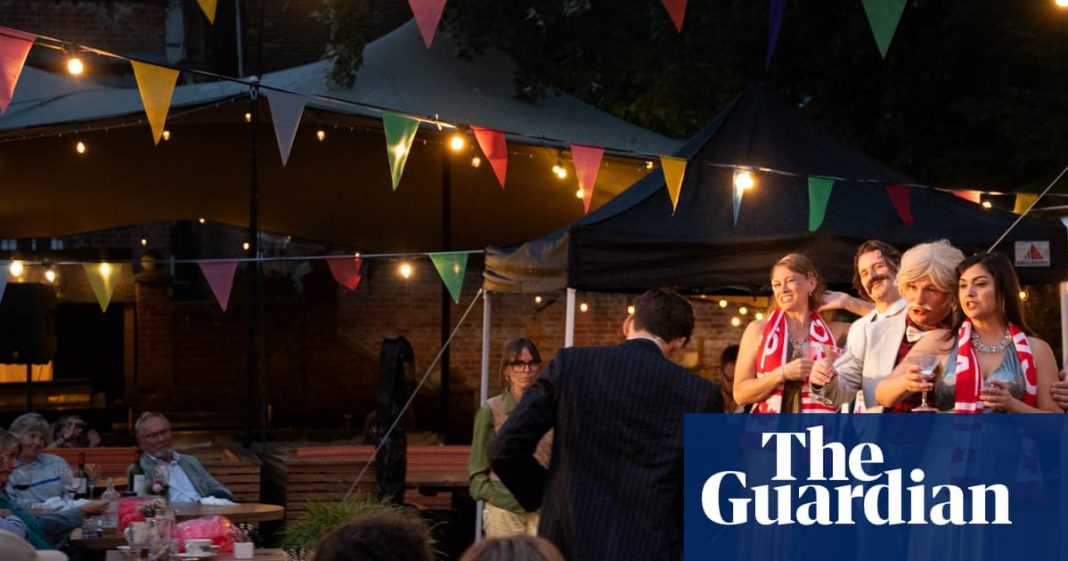By the time Mark Dawson joined the Ship in Hampshire eight years ago, trade had thinned to a trickle. “We were busy when the sun shone,” said the general manager. “But otherwise, it was very quiet.”
Over the next year, Dawson tried a range of ways to attract the local Langstone community. But footfall remained low. “Eventually I decided to go back in time: to themed nights,” he said. “I really went for it – and the success was immediate, lasting and is still growing.”
The Ship is now bustling with locals not just keen to take part in its regular quiz nights, Tina Turner nights and Evenings with Elvis – but eager to bring their homemade crafts to the pub’s annual raft race from the local harbour – last year, more than 2,000 people attended – and its Punch and Judy events (“We ostensibly hold it for the kids but everyone comes,” said Dawson). He somehow had real tanks at the pub for VE Day and – his favourite – holds a Rocky Horror Time Warp dance every Halloween.
“Theme nights used to be popular 20 years ago, then they dropped out of fashion,” he said. “But my experience is that they’re becoming wildly popular again, with younger customers discovering communal, themed silliness for the first time – and older customers rediscovering the joy from their youth.”
Dawson is not alone. Across the UK, pubs are throwing their doors open to themed events: opera under canvas, Shakespeare in garden marquees, film nights in tepees. Clay making, lampshade painting, pinot and Picasso, and floral design workshops now take place in venues once defined by beer mats and televised football.
But it is not about novelty, say experts – it is about necessity. “Theme nights have become key to getting people out of their houses and into pubs and bars,” said Michael Kill, the chief executive officer of the Night Time Industries Association (NTIA).
Kill points to research from the NTIA’s latest Night Time Economy Market Monitor that found the number of themed bars and pubs increased by 5.6% in the second quarter of 2025 – and by 21.4% in the past 12 months.
“We’re revisiting the successes of the past: going back to having fun and not taking ourselves too seriously,” he said. “Themed nights had gone in abeyance over the last few years: the last five years have really just been about keeping your head above water but we’re now seeing a resurgence. Themed nights are the one thing that’s bucking the trend and showing growth.”
Emma McClarkin, the chief executive of the British Beer and Pub Association, agreed. “It’s a major revival,” she said. “Some themes are traditional – murder mysteries, quizzes – but people are also putting on really imaginative events. They’re trying to inspire people to think differently about the pub.”
The crisis underpinning this creative revival is acute. Between January and June 2025, 209 pubs in England and Wales closed permanently – an average of eight a week. In April 2025 alone, 67 pubs entered administration.
More than 20% of UK pubs – more than 8,100 venues – are technically insolvent. Of those, 4,604 are in what is described as the “maximum risk” category, up more than 500 from the previous year.
Cathy Olver, the retail director at Star Pubs, said themed events were part of a survival strategy. “People still want to go out,” she said. “But now, you have to give them a reason.”
after newsletter promotion
Her team works with publicans across the country, supplying full toolkits – posters, social media templates, trophies – for themed nights including Elvis impersonator evenings. “Elvis is always a winner,” she said.
Research conducted by Star Pubs suggests that while competitive socialising appeals strongly to younger people, only 25% of over-65s agree. “Theme nights bridge that gap,” Olver said. “They’re multi-generational.”
Chris Bickle, a director at Savills’ licensed leisure department, said themed nights offered customers “something warm and familiar”. He said: “Life is complicated, judgmental. These nights offer a kind of comfort.”
Bickle sees the industry’s strategy as one of inclusive curation. “Opera and Shakespeare might bring in an older audience. Murder mystery or live comedy could skew younger. You need to attract both.”
The movement is driving innovation: some pubs offer early evening readings, open mic poetry, or wine-and-jazz nights designed to fit between school runs and last orders. “People want a richer experience,” said McClarkin. “It’s not just about the drink any more. Themed nights give people that sense of occasion, something to talk about, something to come back for.”
And, crucially, something to keep the lights on. As margins shrink – publicans make on average 12p profit per pint – the need to offer more than alcohol is no longer optional, it is, for many, the only option left.


